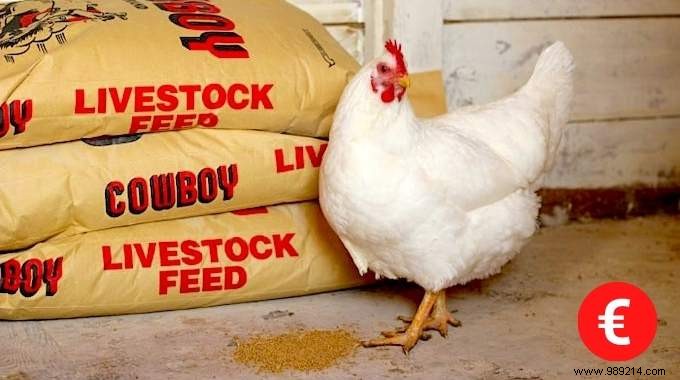
I always dreamed of having chickens to produce my own eggs .
Fresh, very yellow and super healthy eggs for cooking!
The only concern is that feeding chickens has a cost that should not be overlooked...
And this price depends on your region and especially on the harvests. If the harvests have been bad, the prices go up!
However, having happy and well-fed hens at home is the guarantee of having good fresh eggs all year round.
Fortunately, there are tips for saving money on chicken feed while improving their nutrition.
Here are 16 easy tips for feeding your chickens without breaking the bank :

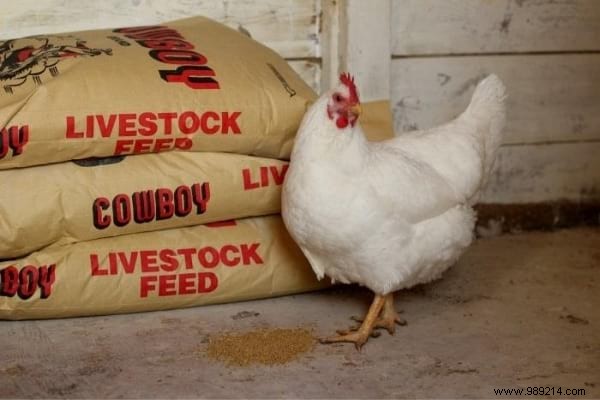
When I called different pet stores, I was surprised by the huge price difference between bags of grain for hens.
But one thing is certain:cheaper is not always a guarantee of quality.
Feeding poor quality feed ends up harming the hens in the long term.
Never sacrifice the health of your hens just to save a few bucks.
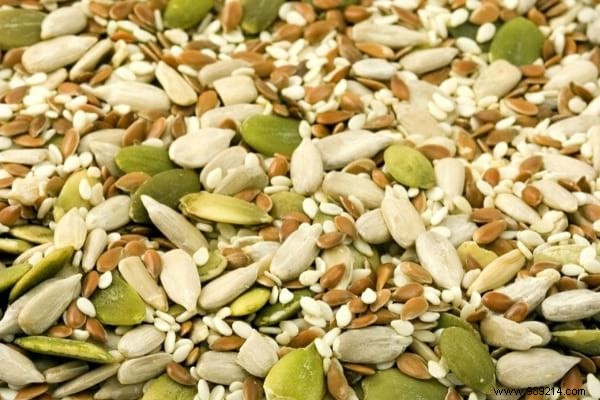
By studying the prices well and choosing bags of seeds at good prices, you can make your own seed mixes.
But be careful that it doesn't cost you MORE than a ready-made mix.
Also check with local farmers to see if they sell a ready mix.
Sometimes they are left with grain that is good for animals, but unsaleable for humans.
Compare the prices well and see what is the most advantageous for you.
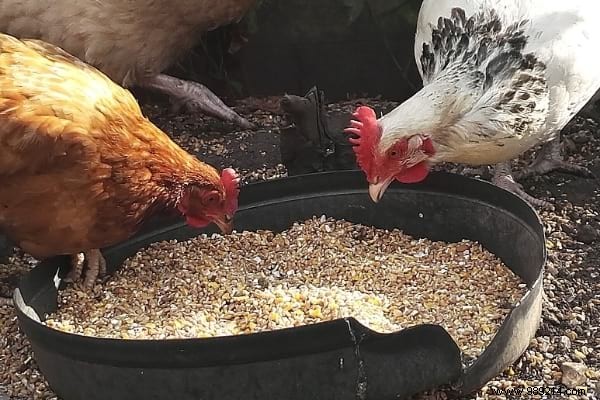
I always buy in bulk, whether it's for me or for my chickens.
Often pet food stores will discount if you buy a pallet rather than a retail bag or two.
Me, I order in bulk and I share my order with my neighbor who also has chickens.
Just one caveat:Foods that have been ground or processed lose their nutritional value during long storage.
The trick is to choose a recipe with whole grains. Why ? Because they keep much longer.
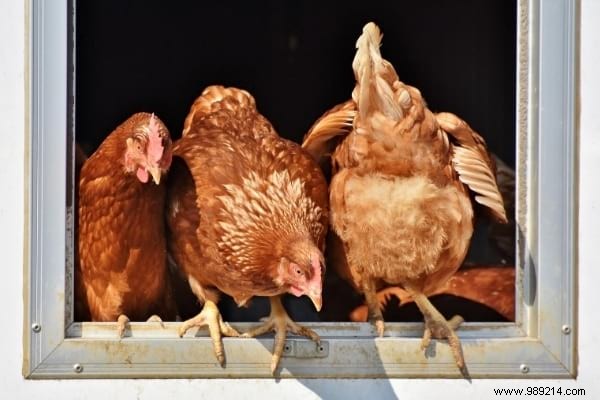
Fermenting chicken feed significantly increases its nutritional value while reducing the amount eaten.
How to do ? Just put 2 or 3 days supply in a bucket and cover the food with water.
Let it swell and add water if necessary.
Cover the bucket with a tea towel to allow air to pass through and stir several times a day.
When small bubbles appear, after a few days, the fermented food is ready!
The method is the same for the germination of seeds to give to hens.
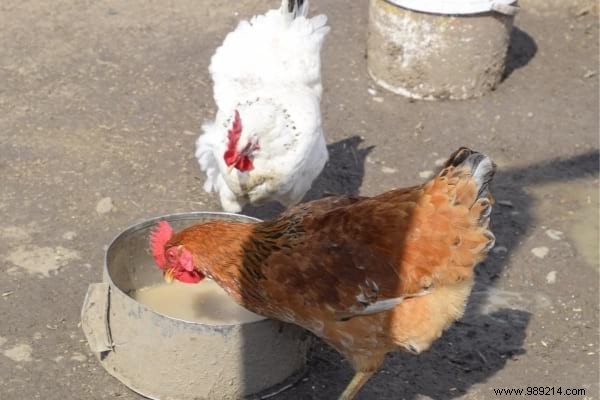
It's a hotly debated subject... Even if I like the idea of leaving the food at will, which allows the hens to self-regulate, it poses a problem with rodents.
Rats and mice think the chicken bowl is self-service for them too!
And they take advantage of it to ruin everything around.
This problem can be avoided by giving the chickens the amount of feed needed for just 1 day.
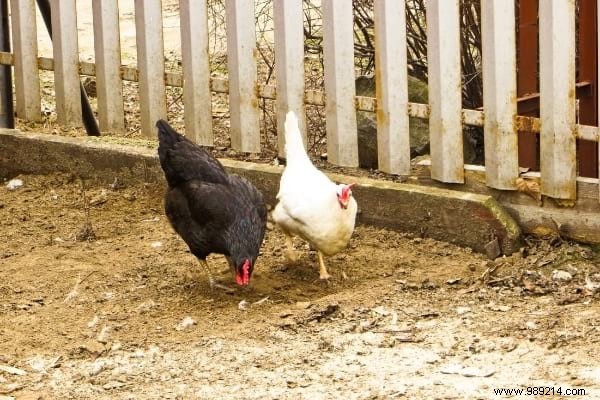
I know it's not possible for everyone, but if you can, let your chickens roam your garden.
At least 1 hour per day. Why?
Because the hens will scavenge and peck at everything they find in your garden.
A good way to supplement their diet for free.
This has another advantage:they love insects and will help control their population.
And then, it's so pleasant and funny to see them running and pecking in front of your eyes in the garden!
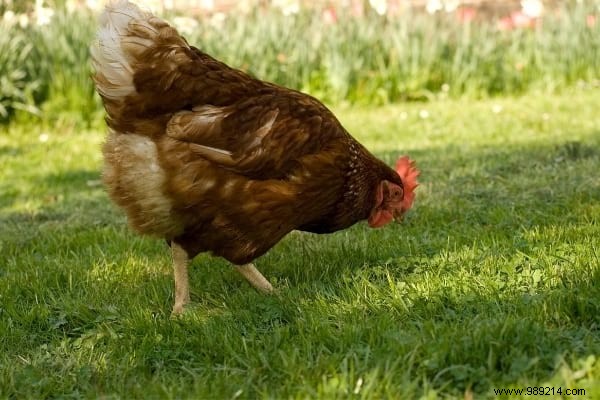
If your chickens can't get out, bring the garden to them!
To do this, collect large handfuls of grass or weeds and feed them to your chickens.
They love to rummage through green grass.
When I weed my garden, I collect these weeds in a bucket and give them.
A great way to recycle green waste.
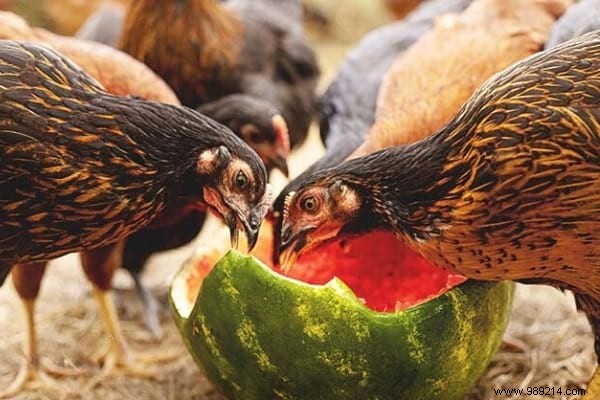
Not all stores are receptive to this practice, but try your luck. Who tries nothing has nothing!
Ask if you can salvage wilted lettuces, crushed tomatoes, or rotten, unsaleable apples.
Some people also salvage leftover stale bread from bakeries.
Personally, I avoid donuts, pastries, sweet rolls or muffins because they are made from processed ingredients and not very healthy additives.
Ideal for a little pleasure, but even for us it is not good, so imagine for our hens.

What if you grew the cereals, green vegetables, sunflowers that the hens need?
Obviously, for this you need to have land.
But if you have it, it's a good idea to save a lot of money, right?

Duckweed is a high-protein plant that can be fed to various animals, including chickens.
Just drop it on the surface of a slightly shady body of water, and it multiplies quickly.
In addition, they require no maintenance and are resistant to the cold in winter.
A great idea for food that costs nothing and that chickens love.

It is very easy to breed black soldier fly larvae.
These flies lay eggs very easily on compost heaps.
Their larvae feed on the decaying matter of the compost.
Well, let's be honest, it's not super glamorous as breeding, but it's a great way to feed chickens cheaply and with high protein content.
In addition, they love these larvae.
So if you don't mind these maggots, this can be a really good way to feed them well without spending too much.
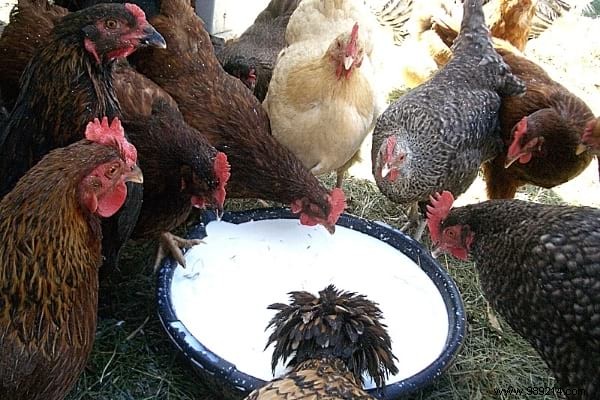
If you own dairy goats, cows or sheep, you know there are times when you're drowning in milk.
Once you've made 50 yogurts, cream, butter, frozen one or two bottles, you don't know what to do with them.
Well, it's time to think about your dear hens!
Leftover milk and whey are full of protein and hens will love this treat.
For an extra boost of probiotic nutrients, put your raw milk at room temperature for several days until it begins to thicken
Be aware, however, that it does not work with pasteurized milk.

Remember to always keep a small bucket next to your sink.
This way you can put fruit and vegetable peelings, leftover bread, leftover plates, etc.
I can tell you it's delirium when I show up at the door of the chicken coop with this bucket full!
Yes, this little waste is a feast for the hens.
Now, as soon as they see someone with a bucket, they chase everyone!
In my house, thanks to the hens, there is not even any more waste.
On the other hand, I have plenty of very yellow and super healthy eggs.
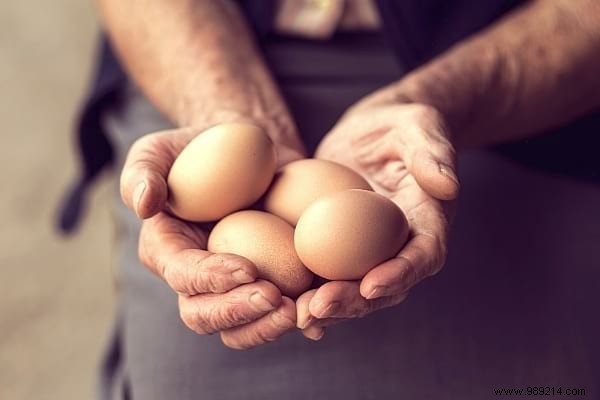
Yes, I know that's not really a way to save money...
...but selling your eggs to neighbors or colleagues is perfect for offsetting food costs.
In the end, you can quickly be "balanced" on your chicken budget with this little trick.
And you'll see, everyone wants good fresh eggs that aren't too expensive!
If your hens have been having a little trouble with powder lately, discover the trick here to stimulate laying.
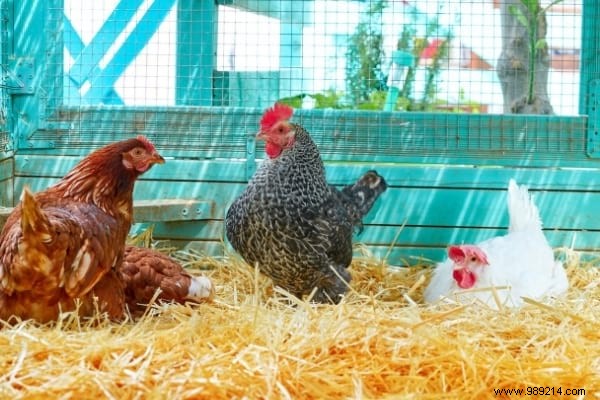
If you keep chickens as pets, then of course this point does not apply to you.
But if you want a little yield with acceptable costs, you will surely have to part with the least productive hens.
You can give the hen to a neighbor or eat it, nothing is lost.
I know this idea will put some people off, but keep in mind that's exactly what our great-grandmother would have done.

Growing your own fodder also saves costs.
Alfalfa, corn, oats are easy to grow, and they provide nutrient-dense foods.
The goal is not to produce it to be 100% autonomous, but to be able to reduce the purchase of food in the trade.